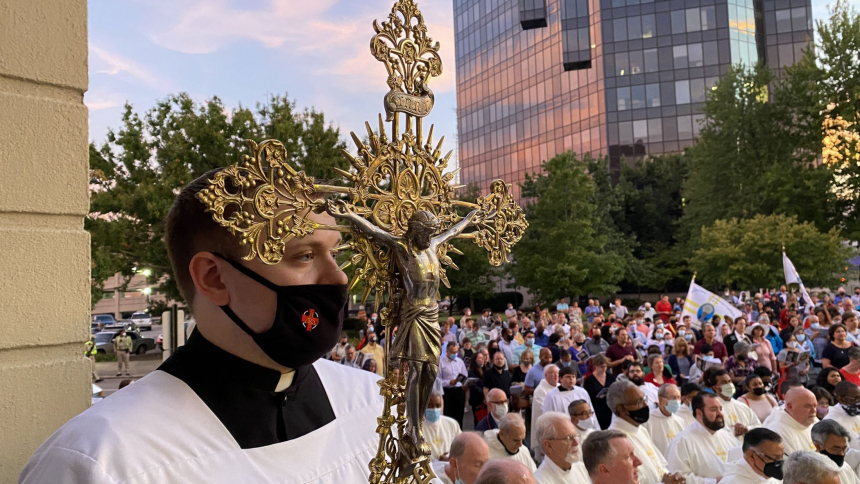
BALTIMORE (CNS) – The U.S. bishops’ focus on the significance of the Eucharist in the life of the church isn’t just about the statement they approved at their fall meeting in Baltimore. It also is about something bigger: a three-year eucharistic revival that will culminate with the National Eucharistic Congress 2024 in Indianapolis.
After discussing wording and language, with amendments accepted, the U.S. bishops approved their statement on the Eucharist with 222 “yes” votes Nov. 17, the second of two days of public sessions during their Nov. 15-18 fall general assembly. The same day, bishops approved the motion to host the Eucharistic Congress with 201 votes in favor, 17 against and five abstentions.
Bishop Kevin C. Rhoades of Fort Wayne-South Bend, Indiana, chairman of the bishops’ doctrine committee, described the 26-page statement, “The Mystery of the Eucharist in the Life of the Church,” as addressing “the fundamental doctrine about the Eucharist that the Church needs to retrieve and revive.”
He also said it is intended to be a theological contribution to the bishops’ strategic plan and to the bishops’ planned eucharistic revival “by providing a doctrinal resource for parishes, catechists and the faithful.”
The statement begins with a description of the Eucharist as “The Gift. Using Scripture, prayers of the Church and Second Vatican Council documents to further illustrate this notion, the gift of the Eucharist is portrayed through the Sacrifice of Christ, the Real Presence of Christ, and Communion with Christ and the Church.
This transformation of bread and wine into the body and blood of Christ, the document says, is “one of the central mysteries of the Catholic faith” which is a “doorway through which we, like the saints and mystics before us, may enter into a deeper perception” of God’s presence.
A good portion of the document focuses on “Our Response” to the gift of the Eucharist. Several important themes are addressed, including Thanksgiving and Worship, Transformation in Christ, Conversion and Food for the Journey.
The document cites St. John Paul II and his statement that the moral life of the Christian “flows from and is nourished by ‘that inexhaustible source of holiness and glorification of God’ that is found in the sacraments, especially the Eucharist: ‘by sharing in the sacrifice of the Cross, the Christian partakes of Christ's self-giving love and is equipped and committed to live this same charity in all his thoughts and deeds.’”
The section on “Being Transformed in Christ” addresses the role of the laity. The document includes instructional messages for Catholics in public service. Regarding the reception of the Eucharist, the document describes “the role of the laity in particular to transform social relations in accord with the love of Christ, which is carried out concretely in actions that work for the objective common good … Lay people who exercise some form of public authority have a special responsibility to form their consciences in accord with the Church’s faith and the moral law, and to serve the human family by upholding human life and dignity.”
The statement ends with examples of saints who were transformed by their reception of the Eucharist and their deep understanding of what it means. It further encourages those who have left the Church to come back.
Most Rev. Robert J. McClory, Bishop of Gary, commented on the statement and plans for a revival, “As the Second Vatican Council teaches, the Eucharist is the source and summit of the Christian life. (This) new teaching document from the USCCB will help us to understand, appreciate, and live, in response to this great gift. As we prepare for a Eucharistic revival and a national Eucharistic Congress in Indy in 2024, this document will help to stimulate prayerful reflection on how to live out the beauty of the Eucharist in our daily lives.”
Auxiliary Bishop Andrew H. Cozzens of St. Paul and Minneapolis, who was recently named bishop of Crookston, Minnesota, and serves as chairman of the U.S. Conference of Catholic Bishops’ Committee on Evangelization and Catechesis said that the revival could be a time of healing for the entire Church as well as a reawakening of understanding of the sacrament of the Eucharist for Catholics across the country.
The revival will officially start on the feast of Corpus Christi on June 16, 2022, with a diocesan focus that will include eucharistic processions and other events of adoration and prayer around the country.
In 2023, the emphasis will be on parishes and resources aimed at increasing Catholics’ understanding of what the Eucharist really means.
Blessed Carlo Acutis will be the patron for the first year of the revival. The Italian teen, who was beatified in October 2020, died of leukemia in 2006 at age 15. He was a programmer who used social media to unite many people and spread Christian values.
In his apostolic letter proclaiming the youth “blessed,” Pope Francis said he “cultivated a friendship with our Lord Jesus, placing the Eucharist and the witness of charity at the center of his life.”
